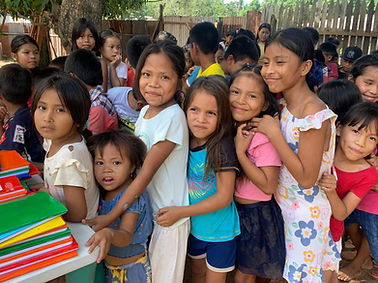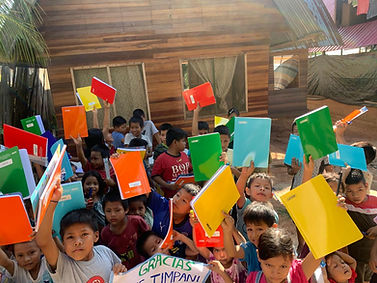
SACRED RECIPROCITY
Our Sacred Reciprocity program has been a foundational piece of the development of the church since the beginning. Our relationships with Indigenous communities, especially those of South America, have forever impacted our lives. We are honored to develop programs and fundraisers to give back to these marginalized populations; the wisdom keepers of our sacrament and traditions. We work directly with the Indigenous tribes of the Amazon Rainforest to learn about their most pressing concerns. The projects provide resources to marginalized communities, encourage the preservation of ancestral wisdom and traditions, improve land stewardship and conservation efforts, and more. We invite you to read more about our current fundraisers and donate to the missions at the pages below. All donations go directly to these initiatives, with the exception of the fee taken out by the host, Go Fund Me.
New School Bathrooms for the Shipibo Children
The Shipibo are one of many Indigenous groups of the Amazon Rainforest in Peru. One of the many communities they reside in is known as Bena Jema, located in Pucallpa. Their local school for the Indigenous children does not receive government assistance, and with many children from poverty-stricken families who cannot financially support their needs, many essential resources are scarce. We have previously done fundraisers which have brought much-needed furniture and supplies to the school with much success!

The director of the school has notified us that their bathrooms are in very poor condition and they are hoping for support in helping to update them for the children, who start their school year in February/March. The Bena Jema school teaches subjects including math, science, art, and language. As a school for the Shipibo indigenous culture, they also incorporate teachings of their community, such as weaving, embroidery, making arrows, and other traditional handicrafts. The initial grades teach children ages from 3 years old to 5 years old. The primary grades teach children ages from 6 years old to 13 years old. After they turn 13, it is common for them to work with their family and in their community or farming, planting bananas and yucca. We are happy to continue our support for this community and the school! The financial goal of just $850 to make this happens feels so achievable to get the children a few functioning bathrooms in their school.

Resources for the Shipibo Children's School
The Shipibo are one of many Indigenous groups of the Amazon Rainforest in Peru. This fundraiser aims to support several schools of the Shipibo communities, including Axeti Nete located in the Panaillo community on the Ucayali River, and Bena Jema located in Pucallpa. These schools teach subjects including math, science, art, and language. As schools of an indigenous culture, they also incorporate teachings of their community, such as weaving, embroidery, making arrows, and other traditional handicrafts.
The initial grades teach children ages from 3 years old to 5 years old. The primary grades teach children ages from 6 years old to 13 years old. After they turn 13, it is common for them to work with their family and in their community or farming, planting bananas and yucca. The Shipibo communities do not receive government assistance, and with many children from poverty-stricken families who cannot financially support their needs, many essential resources are scarce. Both schools infrastructure are also restricted by lack of finances. They have very few furnishings, such as chairs and tables, or even basic school supplies. As the community's need evolve, we will continue to share milestone updates as well as upcoming goals for supporting this cause of bringing resources and tools to the schools and expanding opportunities for education. Since May of 2023, when we began this fundraiser, we've reached some amazing goals with the help of each of you. Here's a recap of what that has looked like from 2023-2024! Bena Jema School: - notebooks, rulers, pencils, pencil sharpeners, etc. for 225 students - workbooks, coloring supplies, and glue for 25 of the younger students (3-5 year olds) - 100 bags (in lieu of backpacks) to school children to carry their supplies - general supplies provided such as colored paper, copy paper, glue, tape, scissors, and art supplies such as markers, crayons, and colored pencils - 50 tables and 50 chairs to replace furniture that was broken or damaged - 6 whiteboards as well as dry erase markers and erasers Axeti Nete School: - notebooks, rulers, pencils, pencil sharpeners, pencil bags, etc. for over 50 students - notebooks, pens, whiteboard supplies, and art supplies for about 10 teachers and their classrooms Numbers of dollars raised or notebooks provided can't possibly quantify the impact of a spark of joy, inspiration, and hope that is brought to the children when they know their quality of life and education is important. These communities continue to express their immense gratitude for people like you -- who care, who want to make a difference, and who know that our world is only as good as we make of it. We can create change. We have the ability to offer love and hope across the globe. So thank you for being you and sharing your light. Donations for the schools are ongoing and we will continue to support and expand to other Shipibo communities as funds allow.
Upcoming Projects

Reviving Ani Xeati
Bringing back a traditional gathering for the Shipibo

Ayahuasca Conservation & Planting
Regenerative and responsible action
How are reciprocity projects chosen and organized?
It's crucial for Indigenous people to lead the development projects in their communities because they have the lived experience, cultural knowledge, and historical understanding necessary to address their unique challenges in ways that are sustainable and respectful of their traditions. When colonial or non-Indigenous individuals take the lead, even with good intentions, they may unconsciously impose colonial mindsets—such as prioritizing Western values, disregarding traditional knowledge, or emphasizing short-term solutions over long-term community well-being. When Indigenous people lead, they reclaim agency over their lands, governance, and futures—creating solutions that are holistic, culturally relevant, and truly effective.
Partnerships with Indigenous-led projects are built on reciprocity, respect, and a recognition of Indigenous sovereignty. Rather than outsiders dictating solutions, true partnership means supporting Indigenous leadership, listening to their priorities, and ensuring that resources flow directly into their communities in ways that empower, rather than control, their work. Funds are contributed in a way that respects Indigenous autonomy, meaning that communities decide how to use resources without external interference. Historically, many funding structures have been paternalistic, requiring Indigenous groups to fit into Western bureaucratic frameworks that may not align with their governance or decision-making processes. Shifting to a model of trust-based funding—where Indigenous people set the priorities and make decisions—is a crucial step toward decolonizing philanthropy and development work.
Ultimately, as non-Indigenous allies, we position ourselves as supporters rather than directors, recognizing that Indigenous self-determination is essential for creating lasting, community-driven solutions.
